Analysis of Cameco's Global Business Environment and Strategy Report
VerifiedAdded on 2020/11/12
|17
|4901
|378
Report
AI Summary
This report provides a detailed analysis of the global business environment, using Cameco as a case study. It begins with an introduction to globalization and its impact on international trade, focusing on factors such as cost, market, environment, and competition. The report then analyzes the strategic challenges faced by organizations operating in the global market, employing PESTEL analysis to examine political, economic, social, technological, environmental, and legal factors. It further explores how the global market influences an organization's culture, structure, and function, utilizing the McKinsey 7S model to evaluate strategy, structure, systems, style, shared values, skills, and staff. Additionally, the report discusses different routes to internationalization. The report concludes with recommendations for Cameco to improve its global operations and navigate the complexities of the international market effectively. The document is contributed by a student to be published on the website Desklib. Desklib is a platform which provides all the necessary AI based study tools for students.
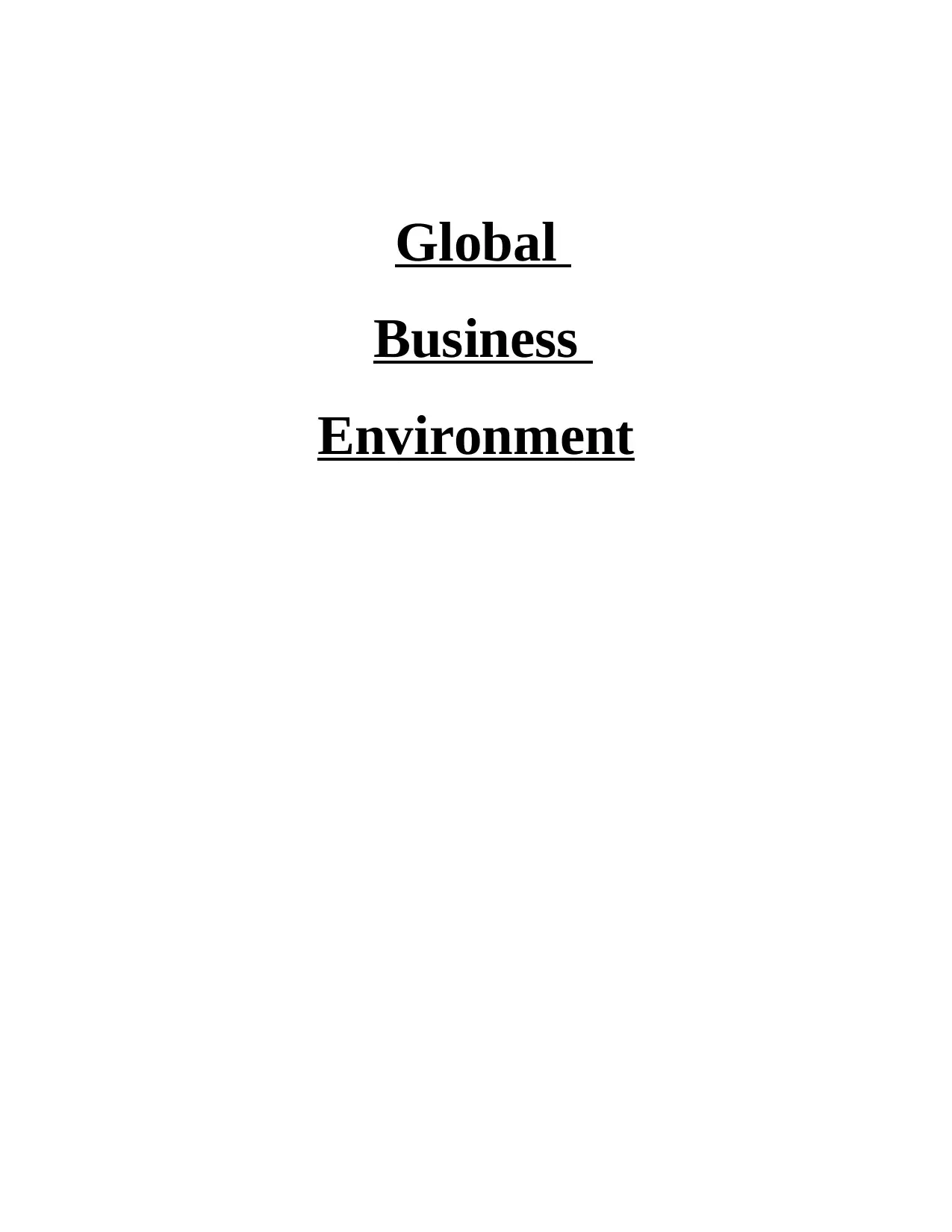
Global
Business
Environment
Business
Environment
Paraphrase This Document
Need a fresh take? Get an instant paraphrase of this document with our AI Paraphraser
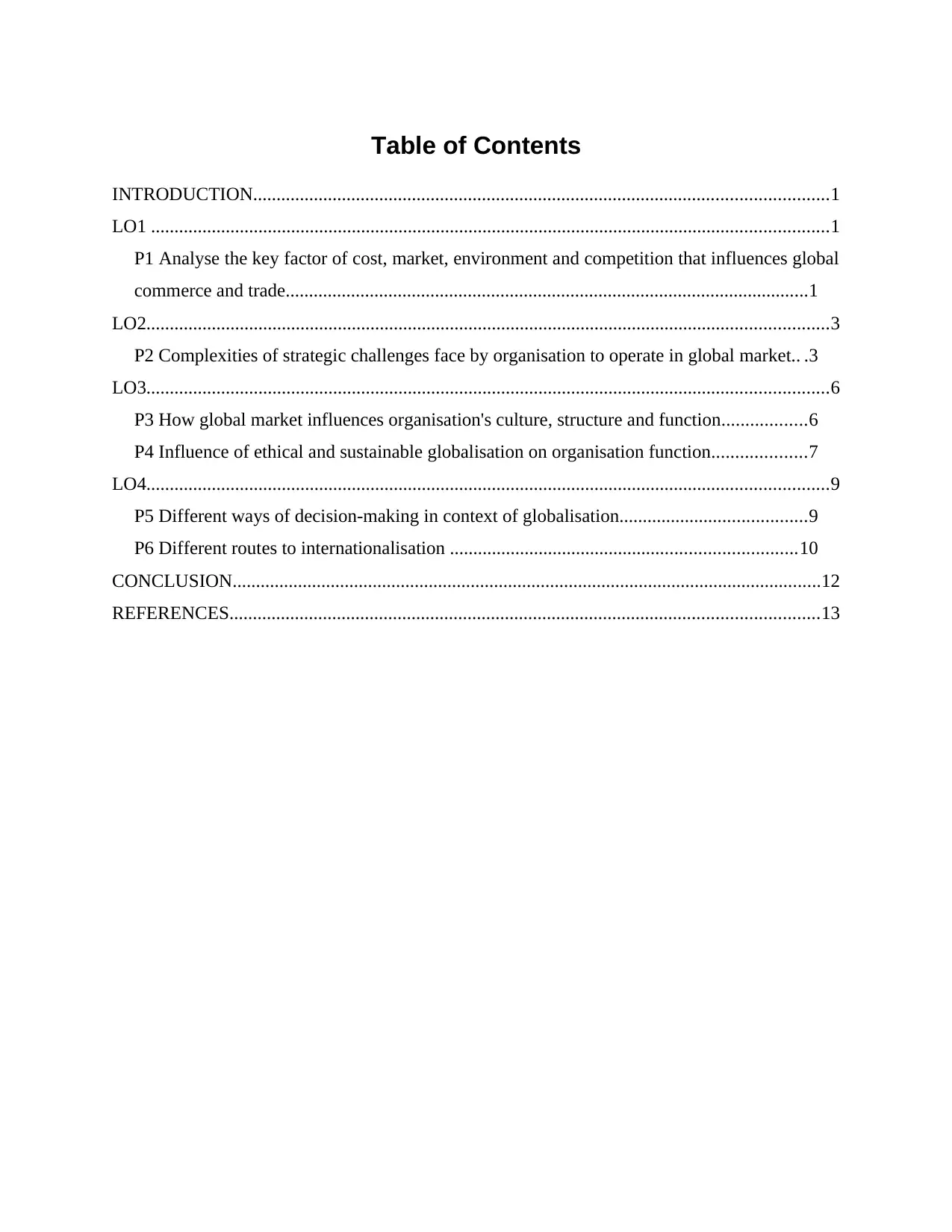
Table of Contents
INTRODUCTION...........................................................................................................................1
LO1 .................................................................................................................................................1
P1 Analyse the key factor of cost, market, environment and competition that influences global
commerce and trade................................................................................................................1
LO2..................................................................................................................................................3
P2 Complexities of strategic challenges face by organisation to operate in global market.. .3
LO3..................................................................................................................................................6
P3 How global market influences organisation's culture, structure and function..................6
P4 Influence of ethical and sustainable globalisation on organisation function....................7
LO4..................................................................................................................................................9
P5 Different ways of decision-making in context of globalisation........................................9
P6 Different routes to internationalisation ..........................................................................10
CONCLUSION..............................................................................................................................12
REFERENCES..............................................................................................................................13
INTRODUCTION...........................................................................................................................1
LO1 .................................................................................................................................................1
P1 Analyse the key factor of cost, market, environment and competition that influences global
commerce and trade................................................................................................................1
LO2..................................................................................................................................................3
P2 Complexities of strategic challenges face by organisation to operate in global market.. .3
LO3..................................................................................................................................................6
P3 How global market influences organisation's culture, structure and function..................6
P4 Influence of ethical and sustainable globalisation on organisation function....................7
LO4..................................................................................................................................................9
P5 Different ways of decision-making in context of globalisation........................................9
P6 Different routes to internationalisation ..........................................................................10
CONCLUSION..............................................................................................................................12
REFERENCES..............................................................................................................................13
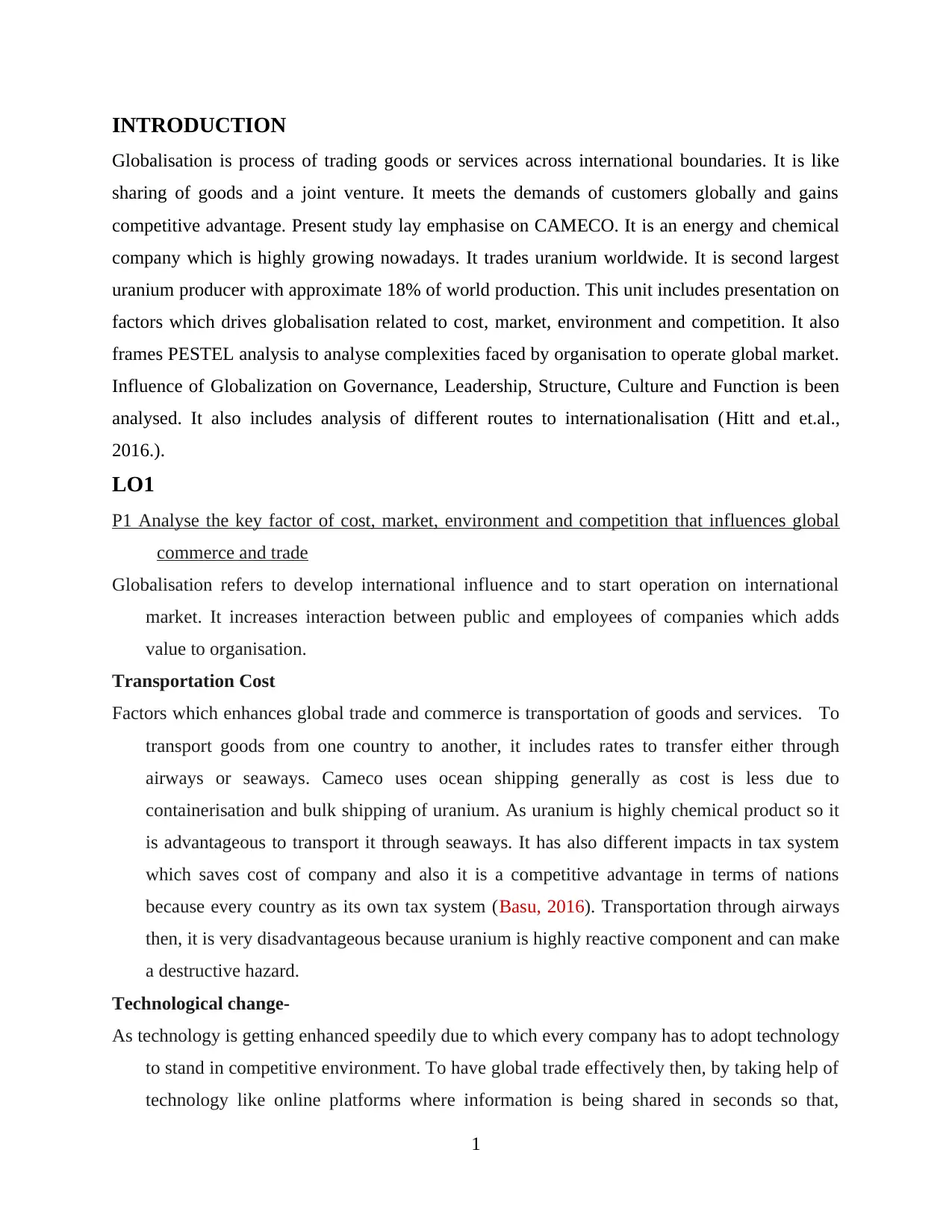
INTRODUCTION
Globalisation is process of trading goods or services across international boundaries. It is like
sharing of goods and a joint venture. It meets the demands of customers globally and gains
competitive advantage. Present study lay emphasise on CAMECO. It is an energy and chemical
company which is highly growing nowadays. It trades uranium worldwide. It is second largest
uranium producer with approximate 18% of world production. This unit includes presentation on
factors which drives globalisation related to cost, market, environment and competition. It also
frames PESTEL analysis to analyse complexities faced by organisation to operate global market.
Influence of Globalization on Governance, Leadership, Structure, Culture and Function is been
analysed. It also includes analysis of different routes to internationalisation (Hitt and et.al.,
2016.).
LO1
P1 Analyse the key factor of cost, market, environment and competition that influences global
commerce and trade
Globalisation refers to develop international influence and to start operation on international
market. It increases interaction between public and employees of companies which adds
value to organisation.
Transportation Cost
Factors which enhances global trade and commerce is transportation of goods and services. To
transport goods from one country to another, it includes rates to transfer either through
airways or seaways. Cameco uses ocean shipping generally as cost is less due to
containerisation and bulk shipping of uranium. As uranium is highly chemical product so it
is advantageous to transport it through seaways. It has also different impacts in tax system
which saves cost of company and also it is a competitive advantage in terms of nations
because every country as its own tax system (Basu, 2016). Transportation through airways
then, it is very disadvantageous because uranium is highly reactive component and can make
a destructive hazard.
Technological change-
As technology is getting enhanced speedily due to which every company has to adopt technology
to stand in competitive environment. To have global trade effectively then, by taking help of
technology like online platforms where information is being shared in seconds so that,
1
Globalisation is process of trading goods or services across international boundaries. It is like
sharing of goods and a joint venture. It meets the demands of customers globally and gains
competitive advantage. Present study lay emphasise on CAMECO. It is an energy and chemical
company which is highly growing nowadays. It trades uranium worldwide. It is second largest
uranium producer with approximate 18% of world production. This unit includes presentation on
factors which drives globalisation related to cost, market, environment and competition. It also
frames PESTEL analysis to analyse complexities faced by organisation to operate global market.
Influence of Globalization on Governance, Leadership, Structure, Culture and Function is been
analysed. It also includes analysis of different routes to internationalisation (Hitt and et.al.,
2016.).
LO1
P1 Analyse the key factor of cost, market, environment and competition that influences global
commerce and trade
Globalisation refers to develop international influence and to start operation on international
market. It increases interaction between public and employees of companies which adds
value to organisation.
Transportation Cost
Factors which enhances global trade and commerce is transportation of goods and services. To
transport goods from one country to another, it includes rates to transfer either through
airways or seaways. Cameco uses ocean shipping generally as cost is less due to
containerisation and bulk shipping of uranium. As uranium is highly chemical product so it
is advantageous to transport it through seaways. It has also different impacts in tax system
which saves cost of company and also it is a competitive advantage in terms of nations
because every country as its own tax system (Basu, 2016). Transportation through airways
then, it is very disadvantageous because uranium is highly reactive component and can make
a destructive hazard.
Technological change-
As technology is getting enhanced speedily due to which every company has to adopt technology
to stand in competitive environment. To have global trade effectively then, by taking help of
technology like online platforms where information is being shared in seconds so that,
1
⊘ This is a preview!⊘
Do you want full access?
Subscribe today to unlock all pages.

Trusted by 1+ million students worldwide
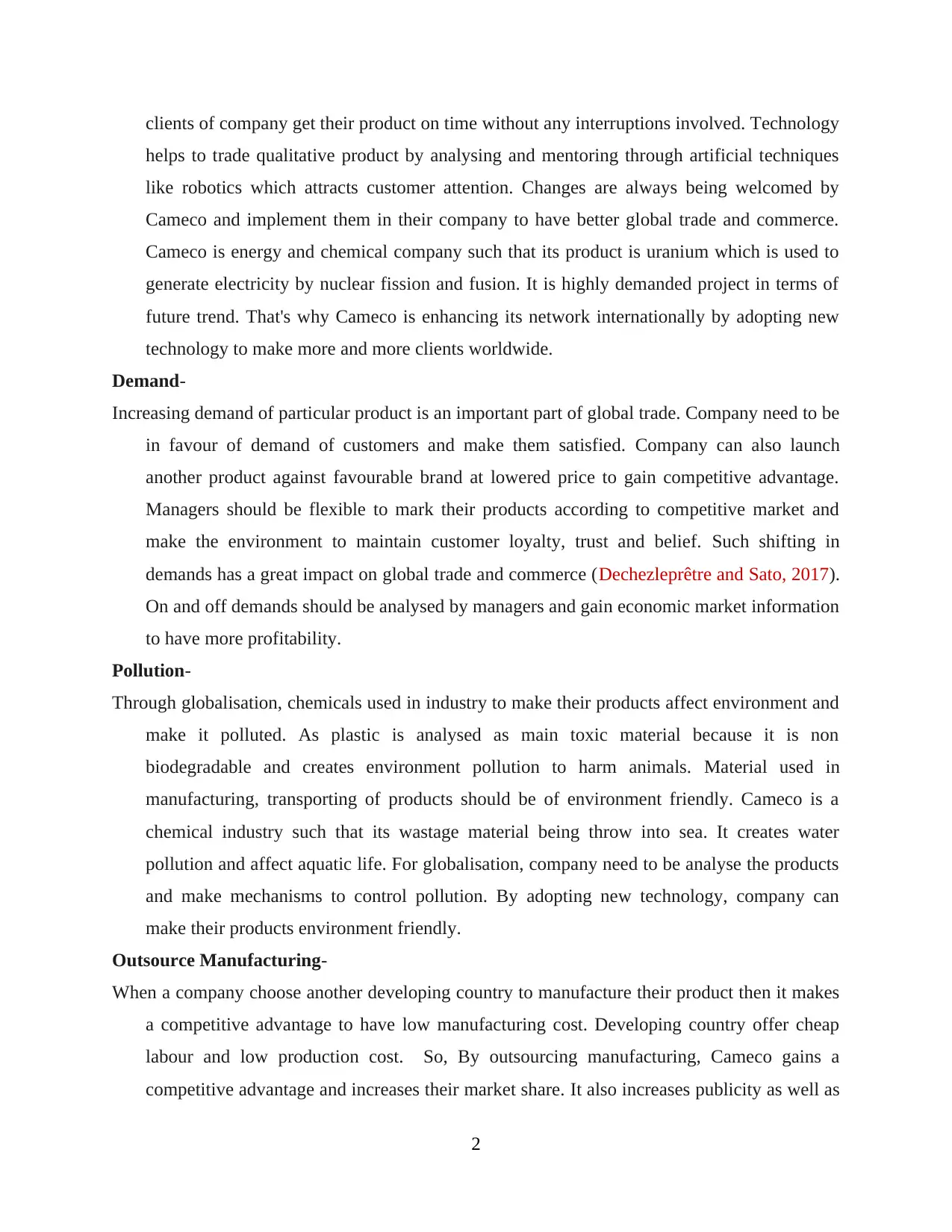
clients of company get their product on time without any interruptions involved. Technology
helps to trade qualitative product by analysing and mentoring through artificial techniques
like robotics which attracts customer attention. Changes are always being welcomed by
Cameco and implement them in their company to have better global trade and commerce.
Cameco is energy and chemical company such that its product is uranium which is used to
generate electricity by nuclear fission and fusion. It is highly demanded project in terms of
future trend. That's why Cameco is enhancing its network internationally by adopting new
technology to make more and more clients worldwide.
Demand-
Increasing demand of particular product is an important part of global trade. Company need to be
in favour of demand of customers and make them satisfied. Company can also launch
another product against favourable brand at lowered price to gain competitive advantage.
Managers should be flexible to mark their products according to competitive market and
make the environment to maintain customer loyalty, trust and belief. Such shifting in
demands has a great impact on global trade and commerce (Dechezleprêtre and Sato, 2017).
On and off demands should be analysed by managers and gain economic market information
to have more profitability.
Pollution-
Through globalisation, chemicals used in industry to make their products affect environment and
make it polluted. As plastic is analysed as main toxic material because it is non
biodegradable and creates environment pollution to harm animals. Material used in
manufacturing, transporting of products should be of environment friendly. Cameco is a
chemical industry such that its wastage material being throw into sea. It creates water
pollution and affect aquatic life. For globalisation, company need to be analyse the products
and make mechanisms to control pollution. By adopting new technology, company can
make their products environment friendly.
Outsource Manufacturing-
When a company choose another developing country to manufacture their product then it makes
a competitive advantage to have low manufacturing cost. Developing country offer cheap
labour and low production cost. So, By outsourcing manufacturing, Cameco gains a
competitive advantage and increases their market share. It also increases publicity as well as
2
helps to trade qualitative product by analysing and mentoring through artificial techniques
like robotics which attracts customer attention. Changes are always being welcomed by
Cameco and implement them in their company to have better global trade and commerce.
Cameco is energy and chemical company such that its product is uranium which is used to
generate electricity by nuclear fission and fusion. It is highly demanded project in terms of
future trend. That's why Cameco is enhancing its network internationally by adopting new
technology to make more and more clients worldwide.
Demand-
Increasing demand of particular product is an important part of global trade. Company need to be
in favour of demand of customers and make them satisfied. Company can also launch
another product against favourable brand at lowered price to gain competitive advantage.
Managers should be flexible to mark their products according to competitive market and
make the environment to maintain customer loyalty, trust and belief. Such shifting in
demands has a great impact on global trade and commerce (Dechezleprêtre and Sato, 2017).
On and off demands should be analysed by managers and gain economic market information
to have more profitability.
Pollution-
Through globalisation, chemicals used in industry to make their products affect environment and
make it polluted. As plastic is analysed as main toxic material because it is non
biodegradable and creates environment pollution to harm animals. Material used in
manufacturing, transporting of products should be of environment friendly. Cameco is a
chemical industry such that its wastage material being throw into sea. It creates water
pollution and affect aquatic life. For globalisation, company need to be analyse the products
and make mechanisms to control pollution. By adopting new technology, company can
make their products environment friendly.
Outsource Manufacturing-
When a company choose another developing country to manufacture their product then it makes
a competitive advantage to have low manufacturing cost. Developing country offer cheap
labour and low production cost. So, By outsourcing manufacturing, Cameco gains a
competitive advantage and increases their market share. It also increases publicity as well as
2
Paraphrase This Document
Need a fresh take? Get an instant paraphrase of this document with our AI Paraphraser
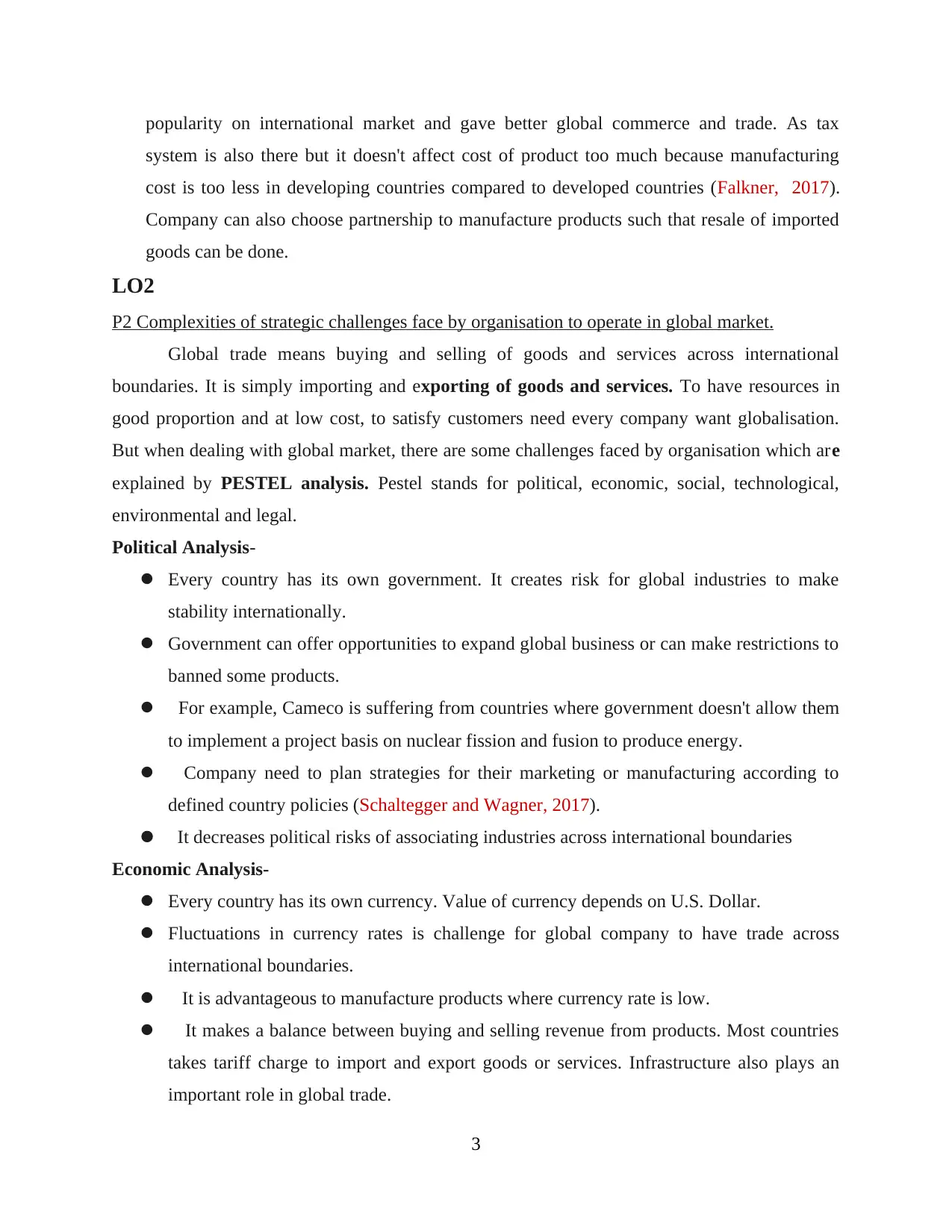
popularity on international market and gave better global commerce and trade. As tax
system is also there but it doesn't affect cost of product too much because manufacturing
cost is too less in developing countries compared to developed countries (Falkner, 2017).
Company can also choose partnership to manufacture products such that resale of imported
goods can be done.
LO2
P2 Complexities of strategic challenges face by organisation to operate in global market.
Global trade means buying and selling of goods and services across international
boundaries. It is simply importing and exporting of goods and services. To have resources in
good proportion and at low cost, to satisfy customers need every company want globalisation.
But when dealing with global market, there are some challenges faced by organisation which are
explained by PESTEL analysis. Pestel stands for political, economic, social, technological,
environmental and legal.
Political Analysis-
Every country has its own government. It creates risk for global industries to make
stability internationally.
Government can offer opportunities to expand global business or can make restrictions to
banned some products.
For example, Cameco is suffering from countries where government doesn't allow them
to implement a project basis on nuclear fission and fusion to produce energy.
Company need to plan strategies for their marketing or manufacturing according to
defined country policies (Schaltegger and Wagner, 2017).
It decreases political risks of associating industries across international boundaries
Economic Analysis-
Every country has its own currency. Value of currency depends on U.S. Dollar.
Fluctuations in currency rates is challenge for global company to have trade across
international boundaries.
It is advantageous to manufacture products where currency rate is low.
It makes a balance between buying and selling revenue from products. Most countries
takes tariff charge to import and export goods or services. Infrastructure also plays an
important role in global trade.
3
system is also there but it doesn't affect cost of product too much because manufacturing
cost is too less in developing countries compared to developed countries (Falkner, 2017).
Company can also choose partnership to manufacture products such that resale of imported
goods can be done.
LO2
P2 Complexities of strategic challenges face by organisation to operate in global market.
Global trade means buying and selling of goods and services across international
boundaries. It is simply importing and exporting of goods and services. To have resources in
good proportion and at low cost, to satisfy customers need every company want globalisation.
But when dealing with global market, there are some challenges faced by organisation which are
explained by PESTEL analysis. Pestel stands for political, economic, social, technological,
environmental and legal.
Political Analysis-
Every country has its own government. It creates risk for global industries to make
stability internationally.
Government can offer opportunities to expand global business or can make restrictions to
banned some products.
For example, Cameco is suffering from countries where government doesn't allow them
to implement a project basis on nuclear fission and fusion to produce energy.
Company need to plan strategies for their marketing or manufacturing according to
defined country policies (Schaltegger and Wagner, 2017).
It decreases political risks of associating industries across international boundaries
Economic Analysis-
Every country has its own currency. Value of currency depends on U.S. Dollar.
Fluctuations in currency rates is challenge for global company to have trade across
international boundaries.
It is advantageous to manufacture products where currency rate is low.
It makes a balance between buying and selling revenue from products. Most countries
takes tariff charge to import and export goods or services. Infrastructure also plays an
important role in global trade.
3
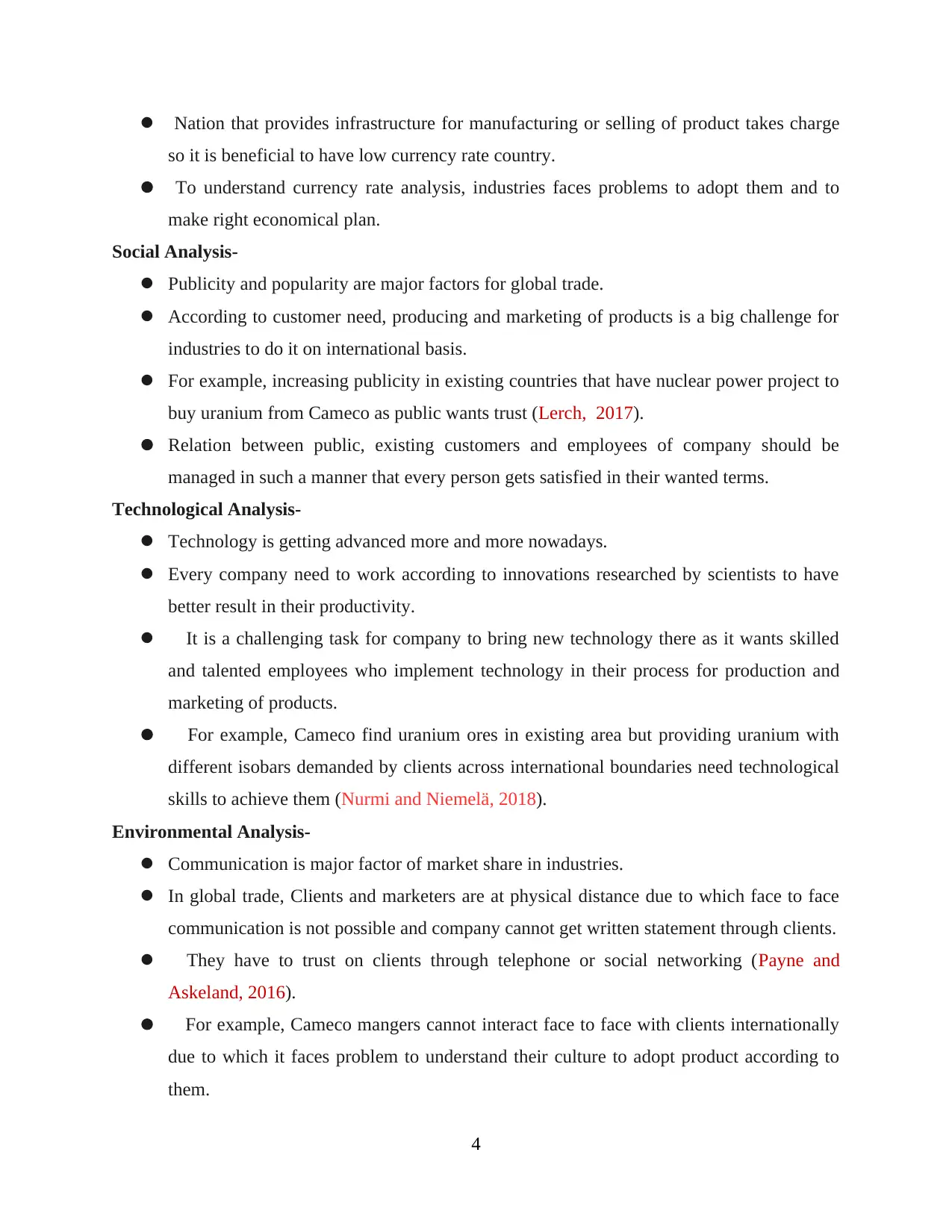
Nation that provides infrastructure for manufacturing or selling of product takes charge
so it is beneficial to have low currency rate country.
To understand currency rate analysis, industries faces problems to adopt them and to
make right economical plan.
Social Analysis-
Publicity and popularity are major factors for global trade.
According to customer need, producing and marketing of products is a big challenge for
industries to do it on international basis.
For example, increasing publicity in existing countries that have nuclear power project to
buy uranium from Cameco as public wants trust (Lerch, 2017).
Relation between public, existing customers and employees of company should be
managed in such a manner that every person gets satisfied in their wanted terms.
Technological Analysis-
Technology is getting advanced more and more nowadays.
Every company need to work according to innovations researched by scientists to have
better result in their productivity.
It is a challenging task for company to bring new technology there as it wants skilled
and talented employees who implement technology in their process for production and
marketing of products.
For example, Cameco find uranium ores in existing area but providing uranium with
different isobars demanded by clients across international boundaries need technological
skills to achieve them (Nurmi and Niemelä, 2018).
Environmental Analysis-
Communication is major factor of market share in industries.
In global trade, Clients and marketers are at physical distance due to which face to face
communication is not possible and company cannot get written statement through clients.
They have to trust on clients through telephone or social networking (Payne and
Askeland, 2016).
For example, Cameco mangers cannot interact face to face with clients internationally
due to which it faces problem to understand their culture to adopt product according to
them.
4
so it is beneficial to have low currency rate country.
To understand currency rate analysis, industries faces problems to adopt them and to
make right economical plan.
Social Analysis-
Publicity and popularity are major factors for global trade.
According to customer need, producing and marketing of products is a big challenge for
industries to do it on international basis.
For example, increasing publicity in existing countries that have nuclear power project to
buy uranium from Cameco as public wants trust (Lerch, 2017).
Relation between public, existing customers and employees of company should be
managed in such a manner that every person gets satisfied in their wanted terms.
Technological Analysis-
Technology is getting advanced more and more nowadays.
Every company need to work according to innovations researched by scientists to have
better result in their productivity.
It is a challenging task for company to bring new technology there as it wants skilled
and talented employees who implement technology in their process for production and
marketing of products.
For example, Cameco find uranium ores in existing area but providing uranium with
different isobars demanded by clients across international boundaries need technological
skills to achieve them (Nurmi and Niemelä, 2018).
Environmental Analysis-
Communication is major factor of market share in industries.
In global trade, Clients and marketers are at physical distance due to which face to face
communication is not possible and company cannot get written statement through clients.
They have to trust on clients through telephone or social networking (Payne and
Askeland, 2016).
For example, Cameco mangers cannot interact face to face with clients internationally
due to which it faces problem to understand their culture to adopt product according to
them.
4
⊘ This is a preview!⊘
Do you want full access?
Subscribe today to unlock all pages.

Trusted by 1+ million students worldwide
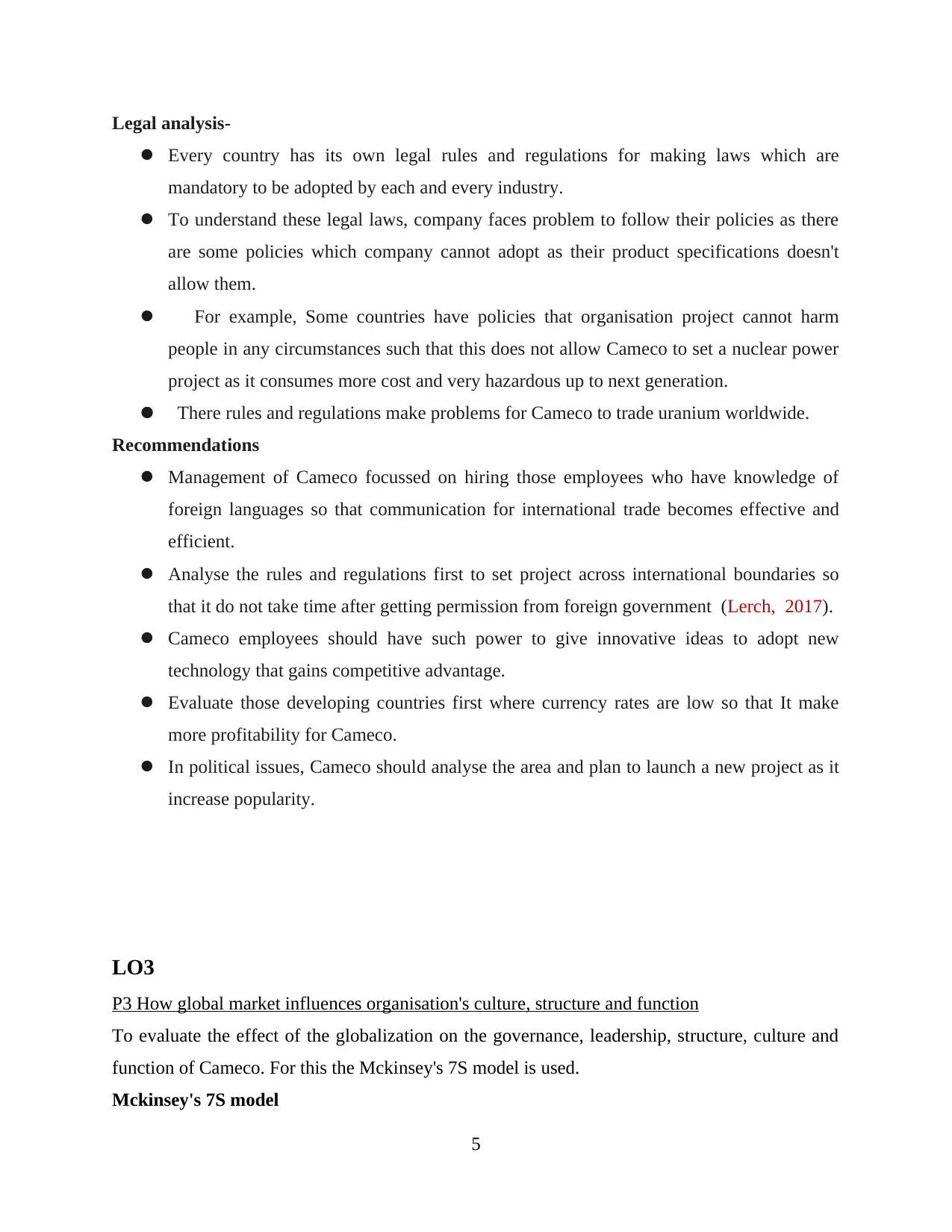
Legal analysis-
Every country has its own legal rules and regulations for making laws which are
mandatory to be adopted by each and every industry.
To understand these legal laws, company faces problem to follow their policies as there
are some policies which company cannot adopt as their product specifications doesn't
allow them.
For example, Some countries have policies that organisation project cannot harm
people in any circumstances such that this does not allow Cameco to set a nuclear power
project as it consumes more cost and very hazardous up to next generation.
There rules and regulations make problems for Cameco to trade uranium worldwide.
Recommendations
Management of Cameco focussed on hiring those employees who have knowledge of
foreign languages so that communication for international trade becomes effective and
efficient.
Analyse the rules and regulations first to set project across international boundaries so
that it do not take time after getting permission from foreign government (Lerch, 2017).
Cameco employees should have such power to give innovative ideas to adopt new
technology that gains competitive advantage.
Evaluate those developing countries first where currency rates are low so that It make
more profitability for Cameco.
In political issues, Cameco should analyse the area and plan to launch a new project as it
increase popularity.
LO3
P3 How global market influences organisation's culture, structure and function
To evaluate the effect of the globalization on the governance, leadership, structure, culture and
function of Cameco. For this the Mckinsey's 7S model is used.
Mckinsey's 7S model
5
Every country has its own legal rules and regulations for making laws which are
mandatory to be adopted by each and every industry.
To understand these legal laws, company faces problem to follow their policies as there
are some policies which company cannot adopt as their product specifications doesn't
allow them.
For example, Some countries have policies that organisation project cannot harm
people in any circumstances such that this does not allow Cameco to set a nuclear power
project as it consumes more cost and very hazardous up to next generation.
There rules and regulations make problems for Cameco to trade uranium worldwide.
Recommendations
Management of Cameco focussed on hiring those employees who have knowledge of
foreign languages so that communication for international trade becomes effective and
efficient.
Analyse the rules and regulations first to set project across international boundaries so
that it do not take time after getting permission from foreign government (Lerch, 2017).
Cameco employees should have such power to give innovative ideas to adopt new
technology that gains competitive advantage.
Evaluate those developing countries first where currency rates are low so that It make
more profitability for Cameco.
In political issues, Cameco should analyse the area and plan to launch a new project as it
increase popularity.
LO3
P3 How global market influences organisation's culture, structure and function
To evaluate the effect of the globalization on the governance, leadership, structure, culture and
function of Cameco. For this the Mckinsey's 7S model is used.
Mckinsey's 7S model
5
Paraphrase This Document
Need a fresh take? Get an instant paraphrase of this document with our AI Paraphraser
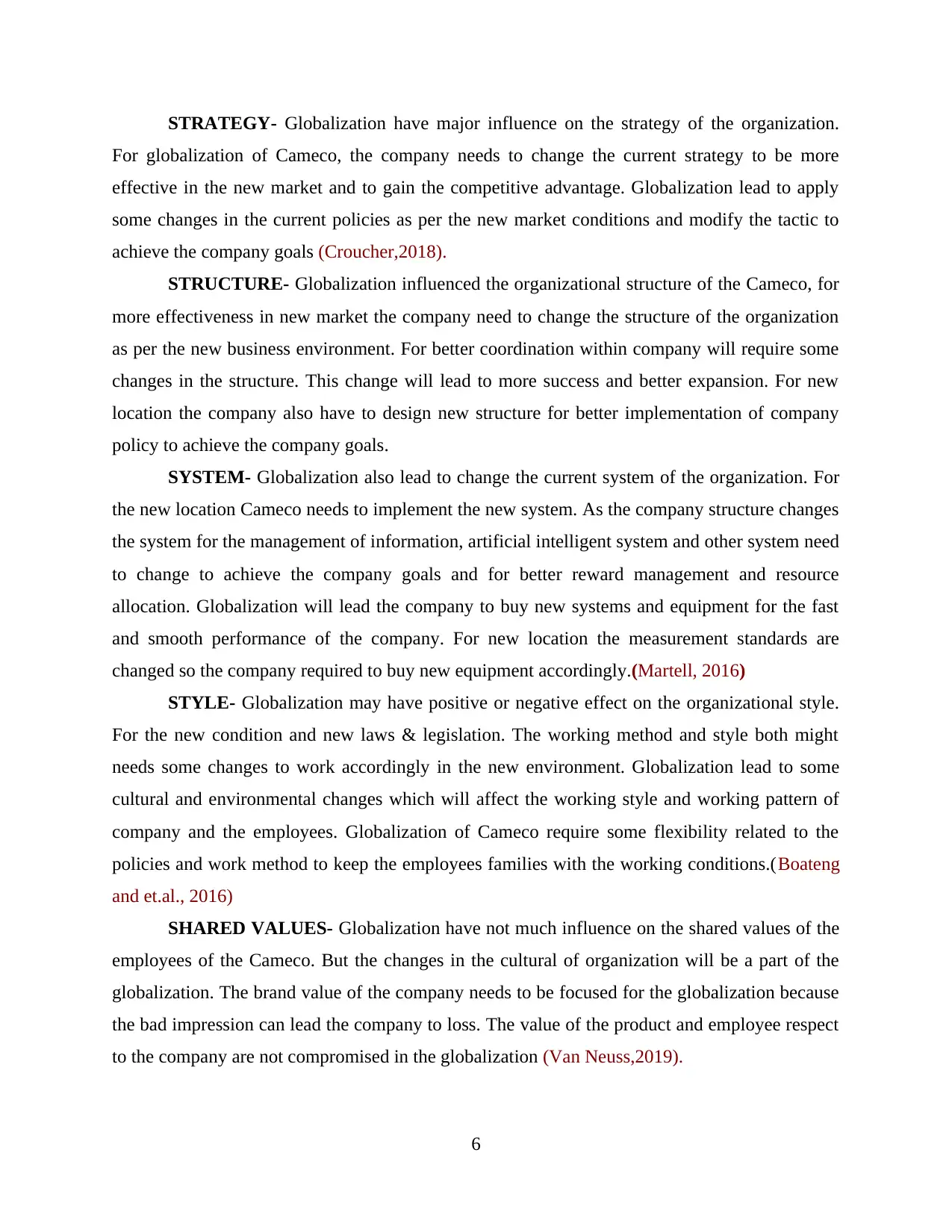
STRATEGY- Globalization have major influence on the strategy of the organization.
For globalization of Cameco, the company needs to change the current strategy to be more
effective in the new market and to gain the competitive advantage. Globalization lead to apply
some changes in the current policies as per the new market conditions and modify the tactic to
achieve the company goals (Croucher,2018).
STRUCTURE- Globalization influenced the organizational structure of the Cameco, for
more effectiveness in new market the company need to change the structure of the organization
as per the new business environment. For better coordination within company will require some
changes in the structure. This change will lead to more success and better expansion. For new
location the company also have to design new structure for better implementation of company
policy to achieve the company goals.
SYSTEM- Globalization also lead to change the current system of the organization. For
the new location Cameco needs to implement the new system. As the company structure changes
the system for the management of information, artificial intelligent system and other system need
to change to achieve the company goals and for better reward management and resource
allocation. Globalization will lead the company to buy new systems and equipment for the fast
and smooth performance of the company. For new location the measurement standards are
changed so the company required to buy new equipment accordingly.(Martell, 2016)
STYLE- Globalization may have positive or negative effect on the organizational style.
For the new condition and new laws & legislation. The working method and style both might
needs some changes to work accordingly in the new environment. Globalization lead to some
cultural and environmental changes which will affect the working style and working pattern of
company and the employees. Globalization of Cameco require some flexibility related to the
policies and work method to keep the employees families with the working conditions.(Boateng
and et.al., 2016)
SHARED VALUES- Globalization have not much influence on the shared values of the
employees of the Cameco. But the changes in the cultural of organization will be a part of the
globalization. The brand value of the company needs to be focused for the globalization because
the bad impression can lead the company to loss. The value of the product and employee respect
to the company are not compromised in the globalization (Van Neuss,2019).
6
For globalization of Cameco, the company needs to change the current strategy to be more
effective in the new market and to gain the competitive advantage. Globalization lead to apply
some changes in the current policies as per the new market conditions and modify the tactic to
achieve the company goals (Croucher,2018).
STRUCTURE- Globalization influenced the organizational structure of the Cameco, for
more effectiveness in new market the company need to change the structure of the organization
as per the new business environment. For better coordination within company will require some
changes in the structure. This change will lead to more success and better expansion. For new
location the company also have to design new structure for better implementation of company
policy to achieve the company goals.
SYSTEM- Globalization also lead to change the current system of the organization. For
the new location Cameco needs to implement the new system. As the company structure changes
the system for the management of information, artificial intelligent system and other system need
to change to achieve the company goals and for better reward management and resource
allocation. Globalization will lead the company to buy new systems and equipment for the fast
and smooth performance of the company. For new location the measurement standards are
changed so the company required to buy new equipment accordingly.(Martell, 2016)
STYLE- Globalization may have positive or negative effect on the organizational style.
For the new condition and new laws & legislation. The working method and style both might
needs some changes to work accordingly in the new environment. Globalization lead to some
cultural and environmental changes which will affect the working style and working pattern of
company and the employees. Globalization of Cameco require some flexibility related to the
policies and work method to keep the employees families with the working conditions.(Boateng
and et.al., 2016)
SHARED VALUES- Globalization have not much influence on the shared values of the
employees of the Cameco. But the changes in the cultural of organization will be a part of the
globalization. The brand value of the company needs to be focused for the globalization because
the bad impression can lead the company to loss. The value of the product and employee respect
to the company are not compromised in the globalization (Van Neuss,2019).
6
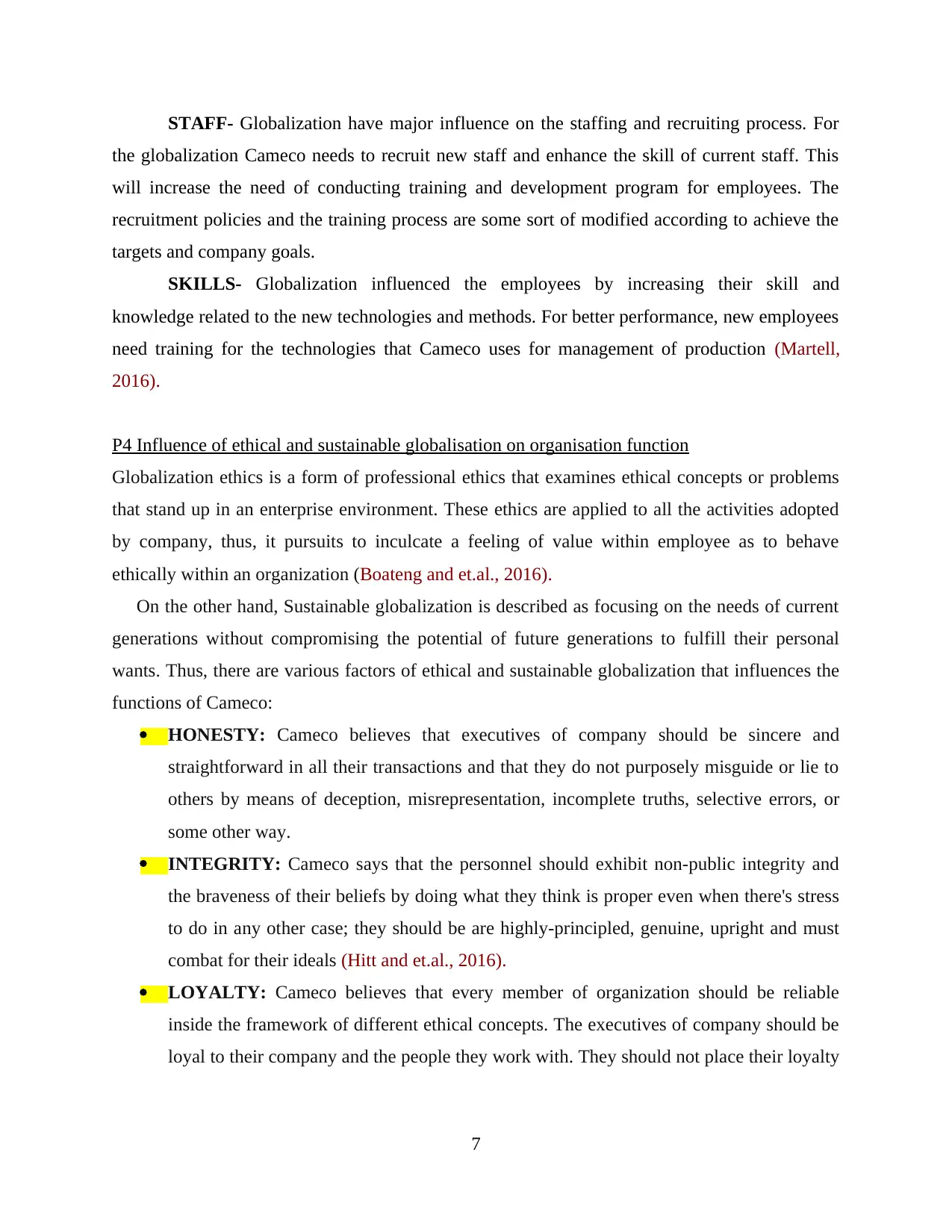
STAFF- Globalization have major influence on the staffing and recruiting process. For
the globalization Cameco needs to recruit new staff and enhance the skill of current staff. This
will increase the need of conducting training and development program for employees. The
recruitment policies and the training process are some sort of modified according to achieve the
targets and company goals.
SKILLS- Globalization influenced the employees by increasing their skill and
knowledge related to the new technologies and methods. For better performance, new employees
need training for the technologies that Cameco uses for management of production (Martell,
2016).
P4 Influence of ethical and sustainable globalisation on organisation function
Globalization ethics is a form of professional ethics that examines ethical concepts or problems
that stand up in an enterprise environment. These ethics are applied to all the activities adopted
by company, thus, it pursuits to inculcate a feeling of value within employee as to behave
ethically within an organization (Boateng and et.al., 2016).
On the other hand, Sustainable globalization is described as focusing on the needs of current
generations without compromising the potential of future generations to fulfill their personal
wants. Thus, there are various factors of ethical and sustainable globalization that influences the
functions of Cameco:
HONESTY: Cameco believes that executives of company should be sincere and
straightforward in all their transactions and that they do not purposely misguide or lie to
others by means of deception, misrepresentation, incomplete truths, selective errors, or
some other way.
INTEGRITY: Cameco says that the personnel should exhibit non-public integrity and
the braveness of their beliefs by doing what they think is proper even when there's stress
to do in any other case; they should be are highly-principled, genuine, upright and must
combat for their ideals (Hitt and et.al., 2016).
LOYALTY: Cameco believes that every member of organization should be reliable
inside the framework of different ethical concepts. The executives of company should be
loyal to their company and the people they work with. They should not place their loyalty
7
the globalization Cameco needs to recruit new staff and enhance the skill of current staff. This
will increase the need of conducting training and development program for employees. The
recruitment policies and the training process are some sort of modified according to achieve the
targets and company goals.
SKILLS- Globalization influenced the employees by increasing their skill and
knowledge related to the new technologies and methods. For better performance, new employees
need training for the technologies that Cameco uses for management of production (Martell,
2016).
P4 Influence of ethical and sustainable globalisation on organisation function
Globalization ethics is a form of professional ethics that examines ethical concepts or problems
that stand up in an enterprise environment. These ethics are applied to all the activities adopted
by company, thus, it pursuits to inculcate a feeling of value within employee as to behave
ethically within an organization (Boateng and et.al., 2016).
On the other hand, Sustainable globalization is described as focusing on the needs of current
generations without compromising the potential of future generations to fulfill their personal
wants. Thus, there are various factors of ethical and sustainable globalization that influences the
functions of Cameco:
HONESTY: Cameco believes that executives of company should be sincere and
straightforward in all their transactions and that they do not purposely misguide or lie to
others by means of deception, misrepresentation, incomplete truths, selective errors, or
some other way.
INTEGRITY: Cameco says that the personnel should exhibit non-public integrity and
the braveness of their beliefs by doing what they think is proper even when there's stress
to do in any other case; they should be are highly-principled, genuine, upright and must
combat for their ideals (Hitt and et.al., 2016).
LOYALTY: Cameco believes that every member of organization should be reliable
inside the framework of different ethical concepts. The executives of company should be
loyal to their company and the people they work with. They should not place their loyalty
7
⊘ This is a preview!⊘
Do you want full access?
Subscribe today to unlock all pages.

Trusted by 1+ million students worldwide
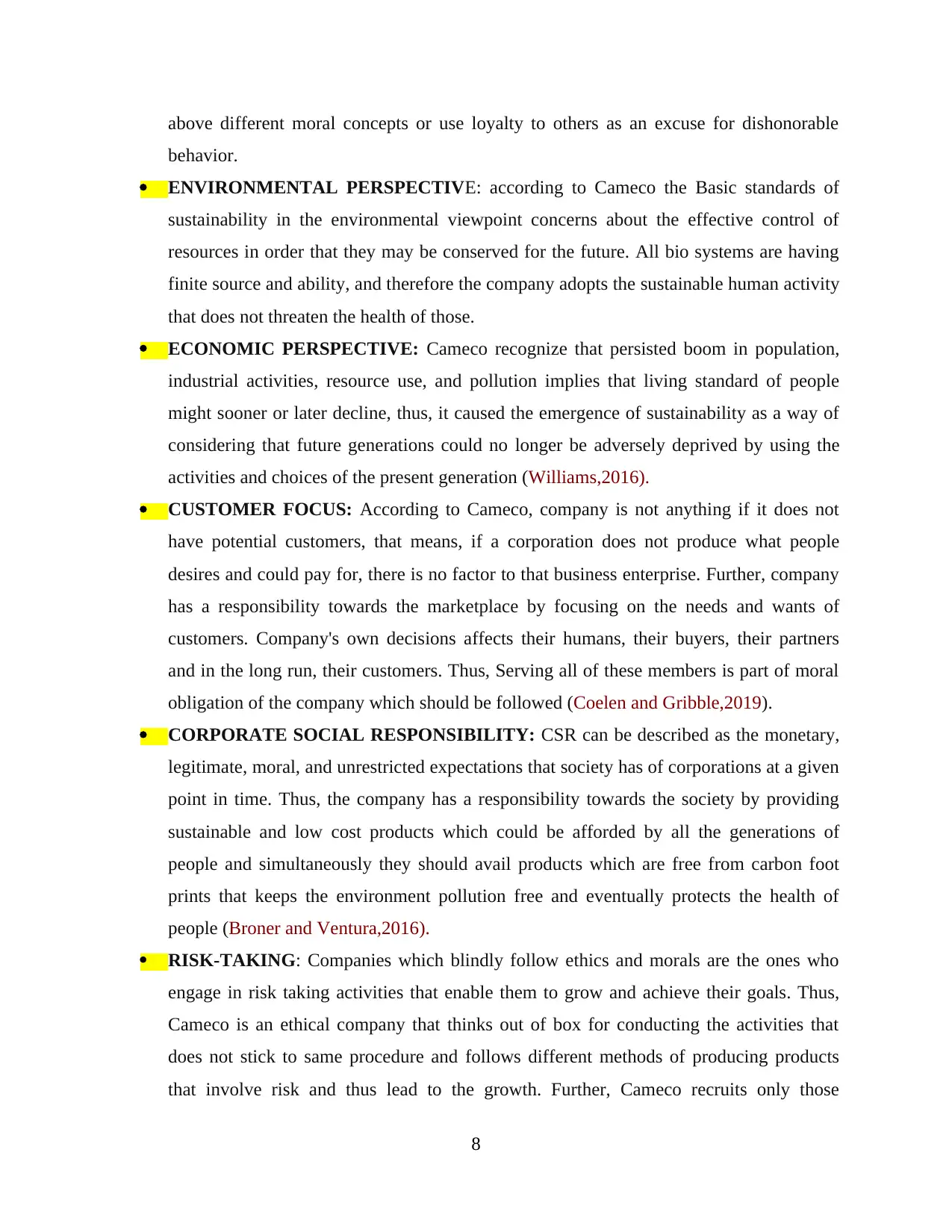
above different moral concepts or use loyalty to others as an excuse for dishonorable
behavior.
ENVIRONMENTAL PERSPECTIVE: according to Cameco the Basic standards of
sustainability in the environmental viewpoint concerns about the effective control of
resources in order that they may be conserved for the future. All bio systems are having
finite source and ability, and therefore the company adopts the sustainable human activity
that does not threaten the health of those.
ECONOMIC PERSPECTIVE: Cameco recognize that persisted boom in population,
industrial activities, resource use, and pollution implies that living standard of people
might sooner or later decline, thus, it caused the emergence of sustainability as a way of
considering that future generations could no longer be adversely deprived by using the
activities and choices of the present generation (Williams,2016).
CUSTOMER FOCUS: According to Cameco, company is not anything if it does not
have potential customers, that means, if a corporation does not produce what people
desires and could pay for, there is no factor to that business enterprise. Further, company
has a responsibility towards the marketplace by focusing on the needs and wants of
customers. Company's own decisions affects their humans, their buyers, their partners
and in the long run, their customers. Thus, Serving all of these members is part of moral
obligation of the company which should be followed (Coelen and Gribble,2019).
CORPORATE SOCIAL RESPONSIBILITY: CSR can be described as the monetary,
legitimate, moral, and unrestricted expectations that society has of corporations at a given
point in time. Thus, the company has a responsibility towards the society by providing
sustainable and low cost products which could be afforded by all the generations of
people and simultaneously they should avail products which are free from carbon foot
prints that keeps the environment pollution free and eventually protects the health of
people (Broner and Ventura,2016).
RISK-TAKING: Companies which blindly follow ethics and morals are the ones who
engage in risk taking activities that enable them to grow and achieve their goals. Thus,
Cameco is an ethical company that thinks out of box for conducting the activities that
does not stick to same procedure and follows different methods of producing products
that involve risk and thus lead to the growth. Further, Cameco recruits only those
8
behavior.
ENVIRONMENTAL PERSPECTIVE: according to Cameco the Basic standards of
sustainability in the environmental viewpoint concerns about the effective control of
resources in order that they may be conserved for the future. All bio systems are having
finite source and ability, and therefore the company adopts the sustainable human activity
that does not threaten the health of those.
ECONOMIC PERSPECTIVE: Cameco recognize that persisted boom in population,
industrial activities, resource use, and pollution implies that living standard of people
might sooner or later decline, thus, it caused the emergence of sustainability as a way of
considering that future generations could no longer be adversely deprived by using the
activities and choices of the present generation (Williams,2016).
CUSTOMER FOCUS: According to Cameco, company is not anything if it does not
have potential customers, that means, if a corporation does not produce what people
desires and could pay for, there is no factor to that business enterprise. Further, company
has a responsibility towards the marketplace by focusing on the needs and wants of
customers. Company's own decisions affects their humans, their buyers, their partners
and in the long run, their customers. Thus, Serving all of these members is part of moral
obligation of the company which should be followed (Coelen and Gribble,2019).
CORPORATE SOCIAL RESPONSIBILITY: CSR can be described as the monetary,
legitimate, moral, and unrestricted expectations that society has of corporations at a given
point in time. Thus, the company has a responsibility towards the society by providing
sustainable and low cost products which could be afforded by all the generations of
people and simultaneously they should avail products which are free from carbon foot
prints that keeps the environment pollution free and eventually protects the health of
people (Broner and Ventura,2016).
RISK-TAKING: Companies which blindly follow ethics and morals are the ones who
engage in risk taking activities that enable them to grow and achieve their goals. Thus,
Cameco is an ethical company that thinks out of box for conducting the activities that
does not stick to same procedure and follows different methods of producing products
that involve risk and thus lead to the growth. Further, Cameco recruits only those
8
Paraphrase This Document
Need a fresh take? Get an instant paraphrase of this document with our AI Paraphraser
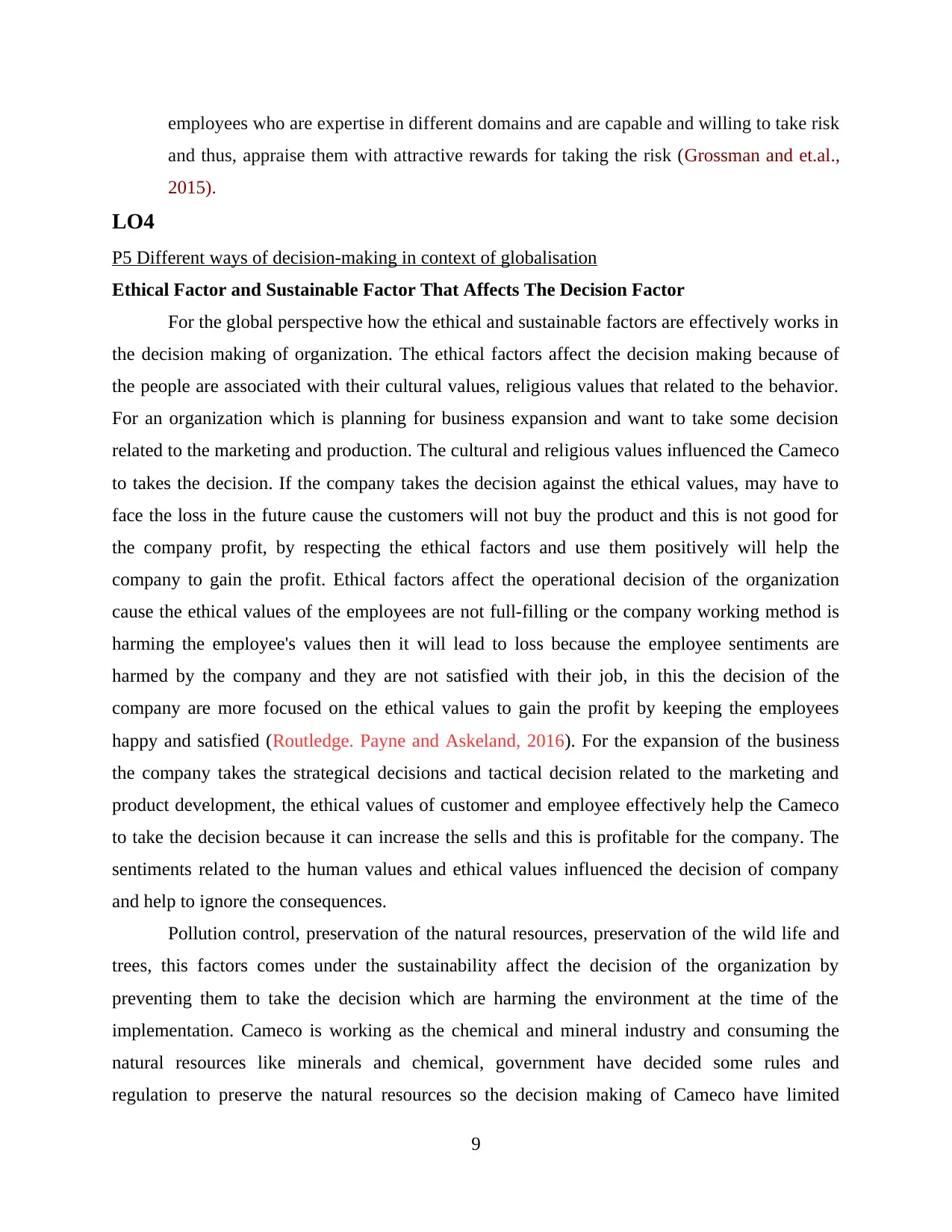
employees who are expertise in different domains and are capable and willing to take risk
and thus, appraise them with attractive rewards for taking the risk (Grossman and et.al.,
2015).
LO4
P5 Different ways of decision-making in context of globalisation
Ethical Factor and Sustainable Factor That Affects The Decision Factor
For the global perspective how the ethical and sustainable factors are effectively works in
the decision making of organization. The ethical factors affect the decision making because of
the people are associated with their cultural values, religious values that related to the behavior.
For an organization which is planning for business expansion and want to take some decision
related to the marketing and production. The cultural and religious values influenced the Cameco
to takes the decision. If the company takes the decision against the ethical values, may have to
face the loss in the future cause the customers will not buy the product and this is not good for
the company profit, by respecting the ethical factors and use them positively will help the
company to gain the profit. Ethical factors affect the operational decision of the organization
cause the ethical values of the employees are not full-filling or the company working method is
harming the employee's values then it will lead to loss because the employee sentiments are
harmed by the company and they are not satisfied with their job, in this the decision of the
company are more focused on the ethical values to gain the profit by keeping the employees
happy and satisfied (Routledge. Payne and Askeland, 2016). For the expansion of the business
the company takes the strategical decisions and tactical decision related to the marketing and
product development, the ethical values of customer and employee effectively help the Cameco
to take the decision because it can increase the sells and this is profitable for the company. The
sentiments related to the human values and ethical values influenced the decision of company
and help to ignore the consequences.
Pollution control, preservation of the natural resources, preservation of the wild life and
trees, this factors comes under the sustainability affect the decision of the organization by
preventing them to take the decision which are harming the environment at the time of the
implementation. Cameco is working as the chemical and mineral industry and consuming the
natural resources like minerals and chemical, government have decided some rules and
regulation to preserve the natural resources so the decision making of Cameco have limited
9
and thus, appraise them with attractive rewards for taking the risk (Grossman and et.al.,
2015).
LO4
P5 Different ways of decision-making in context of globalisation
Ethical Factor and Sustainable Factor That Affects The Decision Factor
For the global perspective how the ethical and sustainable factors are effectively works in
the decision making of organization. The ethical factors affect the decision making because of
the people are associated with their cultural values, religious values that related to the behavior.
For an organization which is planning for business expansion and want to take some decision
related to the marketing and production. The cultural and religious values influenced the Cameco
to takes the decision. If the company takes the decision against the ethical values, may have to
face the loss in the future cause the customers will not buy the product and this is not good for
the company profit, by respecting the ethical factors and use them positively will help the
company to gain the profit. Ethical factors affect the operational decision of the organization
cause the ethical values of the employees are not full-filling or the company working method is
harming the employee's values then it will lead to loss because the employee sentiments are
harmed by the company and they are not satisfied with their job, in this the decision of the
company are more focused on the ethical values to gain the profit by keeping the employees
happy and satisfied (Routledge. Payne and Askeland, 2016). For the expansion of the business
the company takes the strategical decisions and tactical decision related to the marketing and
product development, the ethical values of customer and employee effectively help the Cameco
to take the decision because it can increase the sells and this is profitable for the company. The
sentiments related to the human values and ethical values influenced the decision of company
and help to ignore the consequences.
Pollution control, preservation of the natural resources, preservation of the wild life and
trees, this factors comes under the sustainability affect the decision of the organization by
preventing them to take the decision which are harming the environment at the time of the
implementation. Cameco is working as the chemical and mineral industry and consuming the
natural resources like minerals and chemical, government have decided some rules and
regulation to preserve the natural resources so the decision making of Cameco have limited
9
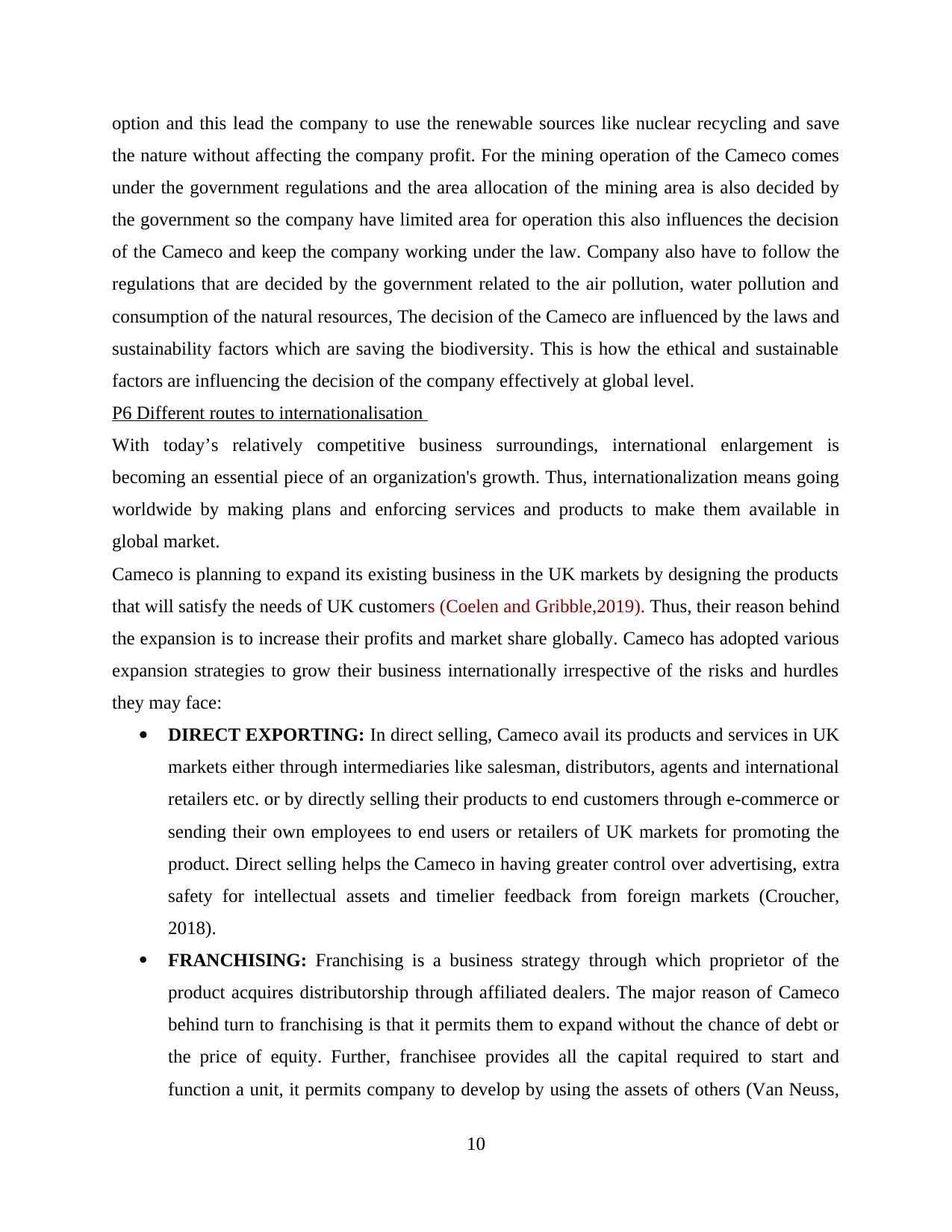
option and this lead the company to use the renewable sources like nuclear recycling and save
the nature without affecting the company profit. For the mining operation of the Cameco comes
under the government regulations and the area allocation of the mining area is also decided by
the government so the company have limited area for operation this also influences the decision
of the Cameco and keep the company working under the law. Company also have to follow the
regulations that are decided by the government related to the air pollution, water pollution and
consumption of the natural resources, The decision of the Cameco are influenced by the laws and
sustainability factors which are saving the biodiversity. This is how the ethical and sustainable
factors are influencing the decision of the company effectively at global level.
P6 Different routes to internationalisation
With today’s relatively competitive business surroundings, international enlargement is
becoming an essential piece of an organization's growth. Thus, internationalization means going
worldwide by making plans and enforcing services and products to make them available in
global market.
Cameco is planning to expand its existing business in the UK markets by designing the products
that will satisfy the needs of UK customers (Coelen and Gribble,2019). Thus, their reason behind
the expansion is to increase their profits and market share globally. Cameco has adopted various
expansion strategies to grow their business internationally irrespective of the risks and hurdles
they may face:
DIRECT EXPORTING: In direct selling, Cameco avail its products and services in UK
markets either through intermediaries like salesman, distributors, agents and international
retailers etc. or by directly selling their products to end customers through e-commerce or
sending their own employees to end users or retailers of UK markets for promoting the
product. Direct selling helps the Cameco in having greater control over advertising, extra
safety for intellectual assets and timelier feedback from foreign markets (Croucher,
2018).
FRANCHISING: Franchising is a business strategy through which proprietor of the
product acquires distributorship through affiliated dealers. The major reason of Cameco
behind turn to franchising is that it permits them to expand without the chance of debt or
the price of equity. Further, franchisee provides all the capital required to start and
function a unit, it permits company to develop by using the assets of others (Van Neuss,
10
the nature without affecting the company profit. For the mining operation of the Cameco comes
under the government regulations and the area allocation of the mining area is also decided by
the government so the company have limited area for operation this also influences the decision
of the Cameco and keep the company working under the law. Company also have to follow the
regulations that are decided by the government related to the air pollution, water pollution and
consumption of the natural resources, The decision of the Cameco are influenced by the laws and
sustainability factors which are saving the biodiversity. This is how the ethical and sustainable
factors are influencing the decision of the company effectively at global level.
P6 Different routes to internationalisation
With today’s relatively competitive business surroundings, international enlargement is
becoming an essential piece of an organization's growth. Thus, internationalization means going
worldwide by making plans and enforcing services and products to make them available in
global market.
Cameco is planning to expand its existing business in the UK markets by designing the products
that will satisfy the needs of UK customers (Coelen and Gribble,2019). Thus, their reason behind
the expansion is to increase their profits and market share globally. Cameco has adopted various
expansion strategies to grow their business internationally irrespective of the risks and hurdles
they may face:
DIRECT EXPORTING: In direct selling, Cameco avail its products and services in UK
markets either through intermediaries like salesman, distributors, agents and international
retailers etc. or by directly selling their products to end customers through e-commerce or
sending their own employees to end users or retailers of UK markets for promoting the
product. Direct selling helps the Cameco in having greater control over advertising, extra
safety for intellectual assets and timelier feedback from foreign markets (Croucher,
2018).
FRANCHISING: Franchising is a business strategy through which proprietor of the
product acquires distributorship through affiliated dealers. The major reason of Cameco
behind turn to franchising is that it permits them to expand without the chance of debt or
the price of equity. Further, franchisee provides all the capital required to start and
function a unit, it permits company to develop by using the assets of others (Van Neuss,
10
⊘ This is a preview!⊘
Do you want full access?
Subscribe today to unlock all pages.

Trusted by 1+ million students worldwide
1 out of 17
Related Documents
Your All-in-One AI-Powered Toolkit for Academic Success.
+13062052269
info@desklib.com
Available 24*7 on WhatsApp / Email
![[object Object]](/_next/static/media/star-bottom.7253800d.svg)
Unlock your academic potential
Copyright © 2020–2026 A2Z Services. All Rights Reserved. Developed and managed by ZUCOL.

![Strategic Challenges & Global Commerce: CAMECO Report, [Course Name]](/_next/image/?url=https%3A%2F%2Fdesklib.com%2Fmedia%2Fimages%2Fjc%2Fc486c00570d04b6a821efb0b3a00a464.jpg&w=256&q=75)



